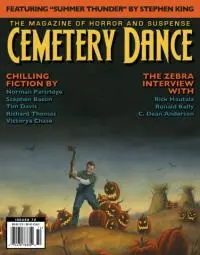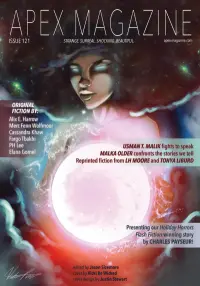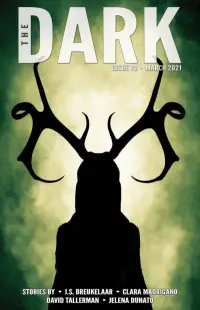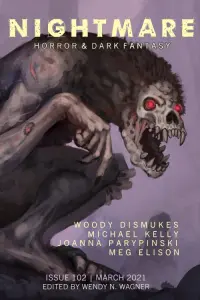I was talking to the students in one of my classes the other day and the topic of submissions came up. We had a long chat about stories, the process, and the dread. That prompted me to ask them WHY they didn’t send out their stories. What was stopping them? What stood in their way? Here are their answers and my responses, which will hopefully encourage them, and YOU, dear reader, to send out your work. How are you going to be discovered if nobody reads your amazing new story? Here is my advice. Hope it helps.
I don't know when it's done. I’m having a hard time finishing the story. I’m a perfectionist.
I hear you. It is difficult. I wrote a column on knowing when your story is done, but let’s expand on that. The best way to finish a story is to start it, to work on it, edit it, applying all of the advice you get in workshops or from peers, and then leave it alone. Perfection is the enemy of the good. Let me tell you a secret—IT WILL NEVER BE PERFECT. What’s more important is that it’s personal, it has emotion, it resonates, and moves readers. You know all about Freytag, I’ve talked about that a lot, so I know you’ve already gone over that. Listen to your peers, listen to your professors, and then keep editing until you don’t know what else to do with it. You should start out with a chainsaw then an axe then a chef’s knife and then a scalpel. The last round of edits should be word choices, commas, little things—adding a sensory detail, changing a word from -ed to -ing for flow, that kind of stuff. When you’ve done everything you can, put it aside. Let it sit for a day, a week if you can. Then come back and read it ONE LAST TIME, not as an author or editor, but as a reader. If it works, if it moves you, then call it done and send it out. I’ve written 6,000-word stories in one day—concept, writing, editing, last read, sent. I was on deadline, of course. You can do this! Don’t be so precious. It’s a story. If it’s horror, did it scare or unsettle you? If it’s fantasy, did it take you to a new world and show you wonder and originality? If it’s a paranoid thriller did it get your heart racing? If you said yes, then you’re done. You will keep evolving as an author, remember that. When I look back on earlier work in my career I cringe sometimes. IT’S OKAY! Of course you’re going to get better, but don’t let that stop you from publishing your best work today.
I have a fear of rejection.
Yeah, it’s tough. But it’s the nature of the beast. Do you not cook because you’re afraid of splattering hot oil? Do you not ride a bike because you’re afraid of crashing? Do you not enter a new relationship out of a fear of a broken heart? Of course not. You do ALL of these things, because that’s life, right? LIVE IT! Rejection is part of the process. I know it hurts. I know it sucks. I’ve been rejected almost 900 times in the last 12 years. I’ve been rejected by friends, rejected in an hour, had my prose called purple by reviewers, had stories that were rejected 20, 40, 100 times before landing with a great publication. You must develop thick skin. ABC—Always. Be. Closing. It’s a numbers game. We’ll talk more about acceptance rates later, but if you have to submit [X] number of times before you get accepted, then send it out. Whether that number is 10 or 20 or 50, send it out. You WILL get rejected. Deal with it. What’s the alternative? Just don’t submit, don’t publish? Well then why are you writing? Come on, you can do this. I know that deep down you know you have talent. You know that story is good. Maybe it’s even great. Believe in your work, because if you don’t, nobody else will.
![]() I have a fear of acceptance.
I have a fear of acceptance.
This one comes right after the other. And I want to say it’s silly, but I know this feeling, too. All of the questions we’re answering today are things that have blocked me as well. But this is one that you really need to not worry about. So you get in, and then what? Fear of not being able to repeat that caliber of work? Of course you can. If you’ve done it once, you can do it again. Trust me. The fear that I have these days is that I worry about getting in, and then I do, and they announce the TOC and I think, “Oh wow, look at all of these amazing authors! Please don’t let my story be the worst one in the magazine (or anthology).” LOL. True. I think that. And you know what, I’ve even had reviewers say on Amazon or Goodreads, “Here are my favorite stories, and here are the ones I didn’t like,” and mine was on the shit list. Hurts. I know. But I’ve also been a story that stood out. You won’t please everyone. Write the story anyway. Submit the story anyway. Do not fear success. You deserve it.
The acceptance rates are so low, why even bother?
Yeah, I know. I hear you. It’s true. But you know what? I’ve broken into markets, against the odds, to places that had an acceptance rate of 5% or 1%, or half a percentage point. You can too. If you start with the top publications, yes, it’s going to be a long, painful journey, most likely. But take the shot! You never know. The first time I broke into Cemetery Dance I was shocked. The second time, even more so. Do you know the odds of getting into The Best Horror of the Year? I hate to even consider it. One in several thousand? And yet, I got in. I laugh about it all now, but back in the day, it used to crush me. Of course The Dark rejected me in 24 hours, for the 12th time. Of course Shimmer hates me, has rejected me 16 times now, and then they went under. Of course Nightmare said no again; at least they were fast. Just to give you an idea here are some rejection totals that I have for the top publications:
Apex—13 rejections
Black Static—5 rejections
Clarkesworld—15 rejections
The Dark—12 rejections (none longer than a week, most 1-3 days)
Lamplight—5 rejections
Lightspeed—4 rejections
F&SF—13 rejections
Nightmare—7 rejections (none more than three days)
Shimmer—16 rejections (dead market now)
Shock Totem—13 rejections (dead market now)
Strange Horizons—5 rejections
Vastarien—4 rejections
Weird Tales—3 rejections
Every one of those stories went on to get published in other markets, mostly at pro rates. But I will never stop submitting to my “white whales.” Why? Because I want to get in! When you’ve exhausted the top markets, work your way down the list. You will find more accepting publications, and eventually that story will get published.
![]() I'm not sure where to send my work.
I'm not sure where to send my work.
Well, the easy answer is—then do your research! That’s what I did. That’s what every author does. I have an ongoing list of where to send your stories, you can start there. It also includes every publication credit I’ve ever gotten. I use Duotrope.com, and make lists there—favorite markets, saved searches, etc. Do that. Join the open call groups on Facebook, there are quite a few. Look at the publications and presses that are nominated for major awards, that win those awards. Look at the TOC of The Best Horror of the Year anthology, and others. I have quite a few Storyville columns that talk about how to submit, using Duotrope, what the awards and best of the year anthologies can teach you, etc. Peruse them. They will help. But saying you don’t know where to send your work just means you haven’t spent the time to figure it out. DO. THE. WORK. How many pro horror markets are there on Duotrope right now? 25. How many if you add in semi-pro? 76. There you go.
I’m not sure what genre my story is.
Okay, I hear you, but I mean, figure it out! LOL. There are only so many main genres, and at a place like Duotrope they have 11 listed—Any, General, Action-Adventure, Erotica, Fantasy, Horror, Mystery/Crime, Romance, Science Fiction, Suspense/Thriller, Western. There you go. Your story will fit into ONE of those categories. If you aren’t sure what a genre is, then look it up. I mean, there is a wide range of horror out there—supernatural, quiet, splatterpunk, Gothic, Lovecraftian, realism, body horror, psychological, etc. But you know what? At the end of the day it’s just HORROR. You say your story is more like dark fantasy with some horrific elements? It’s still horror. It’s a transgressive story, pretty weird? Still horror. It’s in space, and there are aliens? It’s still horror. If it’s unsettling, if it scares you, if it’s disturbing, it probably fits under the horror umbrella. Also, most markets that are open to horror, are also open to fantasy and science fiction. Apex? FHS. The Dark? FH. Strange Horizons? FHS. Some are only open to FS and not horror. So, do your research. People forget that Cemetery Dance says right on the cover, THE MAGAZINE OF HORROR AND SUSPENSE. Both of my stories were paranoid thrillers, and I didn’t think they’d take either of them. They did. Understand your genres. Know that you may write hybrid work. Take the shot. Submit. The worst they can say is no.
The process is dull, boring, and I hate it.
Yeah, get in line. In the beginning when I set up my Duotrope account I spent hours reading markets, adding them to my favorites, setting up searches, etc. But now, when I’m looking to submit, I just pop on over, look up the markets, find the ones that are open, and submit to the best places out there. You will have to spend some time getting set up—whether you are searching via Duotrope or Horror Tree or The Submission Grinder—but really, there are only so many markets. If you’re writing literary fiction, yeah, there are hundreds, so it’s for sure more painful. But for speculative markets there just aren’t that many places.
I don't have something that fits the theme, or fits in general.
Well, then write something new! I mean, if it’s a pizza horror story or an anthology of female warriors set on Mars or a reimagining of classic monsters—sure, you may not have an exact fit. So this is an opportunity to write something new! Do it! Have fun. If you already have stories written, I guarantee you they will work with some of the aforementioned markets, no matter how weird or original or hybrid you think your story is. Also, if it comes to broader themes—loss, love, horror, magic, etc.—then look at your story and see if there is any way that your story can fit. Not sure? Think it’s close? Submit. Take the shot. Like I just said, I wasn’t sure if “Battle Not With Monsters” or “Chasing Ghosts” was a good fit for Cemetery Dance, but I sent them anyway. They took them both.
![]() I don't have the time or money to buy a copy of every magazine out there.
I don't have the time or money to buy a copy of every magazine out there.
I know. So, see what they have online. Go to your local library, used bookstores, peruse the used books on Amazon, see if you can find at least one copy. If you can’t spare $10 to research that market that you really want to get into, then you probably have other priorities that are more pressing. Ask your friends on social media if they have extra copies of XYZ that they can send you. Buy an anthology once a year and read work from across a wide range of publications. You can find a way. When I was submitting my literary short stories after I got my MFA, did I buy a copy of the 100 markets that I submitted to? Of course not. But I had about 20 that I pilfered from the program, some I picked up at the AWP writer’s conference, and another 20 that I found at my local library for $1 each. Be creative. And then actually read them.
I don't have the time.
None of us have the time. If you care about your writing career, then put in the time. Stop drinking, stop playing video games, stop going out, stop watching movies, stop fucking around on social media. You know that you waste time. I do, too. Make the time. Because nobody else is going to do this for you, my man. If you can find the time to write, you can find the time to submit. Once you have markets listed, have a generic cover letter drafted, and your story is formatted and polished up, it shouldn’t take you any time at all. I could go submit a story to ten markets right now, and it would take me about 20 minutes. Check the guidelines, the word count maximums, use Submittable or their submission portal or even email, and BOOM, send them out. Chip away at it. Take 20 minutes a day, or put aside one hour a week, over coffee this Sunday maybe. And have fun! Jesus, this isn’t a criminal trial. Enjoy it! It’s exciting, an opportunity, not a chore. You aren’t getting teeth pulled.
The work isn't good enough, I suck, nobody loves me, they'll never take it, why even bother?
Listen, Eeyore, I know how you feel. I do. Honestly. I feel that way all the time. I have imposter syndrome some days too. And then next week I’ll be king of the world. You need to cut this shit out right now. You can tell I’m getting worked up because I’ve cursed a few times. LOL. If you honestly don’t think the story works, then fix it. See my first answer to this column. But honestly—listen to your workshop peers and your teachers. They are not blowing smoke, they aren’t kissing your ass, they aren’t making this up. If an editor rejects a story but says send me more, they mean it! If you have taken one of my classes and I say a story is ready, or it’s amazing, then I mean it! If you can’t trust yourself (yet) to analyze your own writing, to tell when it’s done, or good, or special, then rely on your peers and professors. But in time you need to be able to do that. Why is it you can take criticism in class, but can’t accept the compliments? You must develop the skills to fix your work, but also learn to leave it alone when it’s working. When people respond to a scene, remember what you did, read that part again, and know that you are doing good things there. Keep doing that. It will take time to write truly amazing fiction—days, weeks, months, probably years. That’s okay. First, write a story. A complete story that works. Then, write a better story. Then, write an amazing story. You can do it.
The rejection is demoralizing.
 If I told you that you had to bounce a tennis ball ten times to get a cold beer, or a hot fudge sundae, or a hug, would you stop at four? No. You’d keep bouncing that ball. Do your best work, understand that if a publication rejects 99/100 or 95/100 then of course you’re going to get rejected a lot. Understand it’s part of the process. Don’t take it personally. Keep going. I’ve rejected work as an editor at Gamut or Dark House Press because it didn’t fit our theme, even though I loved it, I knew that the author was a big name, and it sold the next week to Clarkesworld or somewhere. I rejected lots of great camera stories for Exigencies because I’d already taken two camera stories. We get rejected for a number of reasons. But rarely because the work is terrible. Bad fit, too long, too short, not a theme the editor likes, not a style that works for that editor, a concept that’s been done a lot. So many reasons. And the next editor may just say yes. The rejections are demoralizing only if you let them be demoralizing. They are just a means to an end. Keep going.
If I told you that you had to bounce a tennis ball ten times to get a cold beer, or a hot fudge sundae, or a hug, would you stop at four? No. You’d keep bouncing that ball. Do your best work, understand that if a publication rejects 99/100 or 95/100 then of course you’re going to get rejected a lot. Understand it’s part of the process. Don’t take it personally. Keep going. I’ve rejected work as an editor at Gamut or Dark House Press because it didn’t fit our theme, even though I loved it, I knew that the author was a big name, and it sold the next week to Clarkesworld or somewhere. I rejected lots of great camera stories for Exigencies because I’d already taken two camera stories. We get rejected for a number of reasons. But rarely because the work is terrible. Bad fit, too long, too short, not a theme the editor likes, not a style that works for that editor, a concept that’s been done a lot. So many reasons. And the next editor may just say yes. The rejections are demoralizing only if you let them be demoralizing. They are just a means to an end. Keep going.
The no simultaneous submissions policies are killing me.
Yeah, I hear you. There are a few approaches here.
One, you could just ignore them. But I didn’t tell you that. If you are still evolving, and it’s a long-shot to get in, screw it, send your story far and wide. But, editors do talk, you can get blackballed. Early in my career I ignored the NSS policy, and then got a story into two markets on the same day. Oops. I had to lie to one publication when I pulled my story, saying I didn’t see their NSS policy, and I apologized. I stopped doing that. So, Plan B! Luckily, most of the elite markets that do still have a NSS policy (which I do hate, BTW) are relatively fast. So, just honor the policy and send your work out. Here is how I usually do it.
Plan A: Submit to the elite, fast NSS markets one at a time. Apex, Clarkesworld, The Dark, Fantasy, F&SF, Nightmare, Strange Horizons, Vastarien, and a few semi, like Black Static. For these, I usually start with the fastest—The Dark (2 days), Clarkesworld (4 days), F&SF (3 days), etc. and then work my way out. This might take you a few weeks, or a few months.
Plan B: Hit the markets that are open to simultaneous—PRO FIRST, Augur, Flame Tree, Pseudopod, and then SEMI SECOND, Lamplight, PULP Literature, etc.
Because my dream markets are NSS I’d start there over the Plan B markets. The other thing you can do, especially if you’re taking a workshop where you may be writing several stories in a short period of time, is finish a FEW of them and send them all out at the same time. So, “Fever Dream” goes to The Dark, and “Lost in a Forest” goes to Nightmare, and “Dead End Job” goes to F&SF. Rinse, and repeat. When I came out of my MFA program I had seven stories out to over 100 markets (mostly literary journals) at the same time. This can help if you’re obsessively checking your email for responses. Knowing that I have a few stories out in the world helps calm me down. I feel like I’m doing something, and not just screwing around. And while those stories are bouncing around—write new ones! Or maybe that novel.
In conclusion.
I know it’s hard. I know it’s exhausting. You act like I haven’t cried getting a particularly painful rejection, or a particularly surprising acceptance. I’ve been there. But the one thing I do not want to hear from my students, or my peers, or any of you authors out there busting your asses to get your work done, is that you’re not submitting your work. It kills me. I’m lucky that I have had so many talented students in my classes. If I’ve said your story is great, special, amazing, horrifying, inspiring, powerful, or something else that’s a glowing review, then look at my edits, and then send it out. Please. Write it, edit it, workshop it, edit it again, get that last feedback, give it one last read, and then submit your work. Push it out of the nest. Set it free. There are people out there that need to read your work. They are suffering, and you are the light. They are lonely, and you are a friend in the dark. They are numb, and they need to be unsettled, and woken up. Do it. I believe in you. Best of luck.
(And when you do break into these markets, please come back here and tell me! It’ll make my day.)

About the author
Richard Thomas is the award-winning author of seven books: three novels—Disintegration and Breaker (Penguin Random House Alibi), as well as Transubstantiate (Otherworld Publications); three short story collections—Staring into the Abyss (Kraken Press), Herniated Roots (Snubnose Press), and Tribulations (Cemetery Dance); and one novella in The Soul Standard (Dzanc Books). With over 140 stories published, his credits include The Best Horror of the Year (Volume Eleven), Cemetery Dance (twice), Behold!: Oddities, Curiosities and Undefinable Wonders (Bram Stoker winner), PANK, storySouth, Gargoyle, Weird Fiction Review, Midwestern Gothic, Gutted: Beautiful Horror Stories, Qualia Nous, Chiral Mad (numbers 2-4), and Shivers VI (with Stephen King and Peter Straub). He has won contests at ChiZine and One Buck Horror, has received five Pushcart Prize nominations, and has been long-listed for Best Horror of the Year six times. He was also the editor of four anthologies: The New Black and Exigencies (Dark House Press), The Lineup: 20 Provocative Women Writers (Black Lawrence Press) and Burnt Tongues (Medallion Press) with Chuck Palahniuk. He has been nominated for the Bram Stoker, Shirley Jackson, and Thriller awards. In his spare time he is a columnist at Lit Reactor and Editor-in-Chief at Gamut Magazine. His agent is Paula Munier at Talcott Notch. For more information visit www.whatdoesnotkillme.com.
 I have a fear of acceptance.
I have a fear of acceptance.
 I'm not sure where to send my work.
I'm not sure where to send my work.
 I don't have the time or money to buy a copy of every magazine out there.
I don't have the time or money to buy a copy of every magazine out there.








